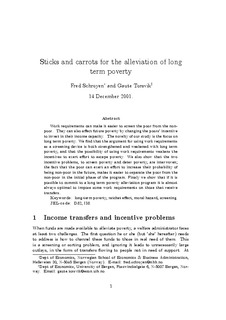| dc.contributor.author | Schroyen, Fred | |
| dc.contributor.author | Torsvik, Gaute | |
| dc.date.accessioned | 2006-08-10T11:22:59Z | |
| dc.date.available | 2006-08-10T11:22:59Z | |
| dc.date.issued | 2001-12 | |
| dc.identifier.issn | 0804-6824 | |
| dc.identifier.uri | http://hdl.handle.net/11250/162952 | |
| dc.description.abstract | Work requirements can make it easier to screen the poor from the nonpoor.
They can also affect future poverty by changing the poors’ incentive
to invest in their income capacity. The novelty of our study is the focus on
long-term poverty. We find that the argument for using work requirements
as a screening device is both strengthened and weakened with long-term
poverty, and that the possibility of using work requirements weakens the
incentives to exert effort to escape poverty. We also show that the two
incentive problems, to screen poverty and deter poverty, are interwoven;
the fact that the poor can exert an effort to increase their probability of
being non-poor in the future, makes it easier to separate the poor from the
non-poor in the initial phase of the program. Finaly we show that if it is
possible to commit to a long-term poverty alleviation program it is almost
always optimal to impose some work requirements on those that receive transfers. | en |
| dc.format.extent | 695697 bytes | |
| dc.format.mimetype | application/pdf | |
| dc.language.iso | eng | en |
| dc.publisher | Norwegian School of Economics and Business Administration. Department of Economics | en |
| dc.relation.ispartofseries | Discussion paper | en |
| dc.relation.ispartofseries | 2001:34 | en |
| dc.subject | long-term poverty | en |
| dc.subject | ratchet effect | en |
| dc.subject | moral hazard | en |
| dc.subject | screening | en |
| dc.title | Sticks and carrots for the alleviation of long-term poverty | en |
| dc.type | Working paper | en |
